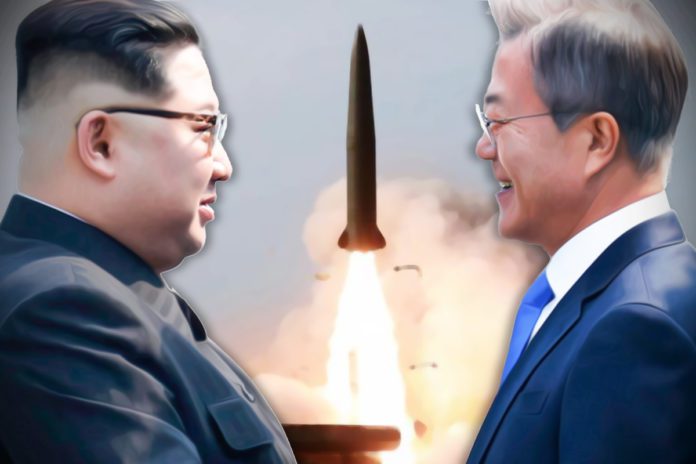A new study shows that almost every South Korean now believes that North Korea is unlikely to give up its nuclear weapons, despite the Moon Jae-in administration’s desperate appeasement of the North as they continue to lie about its commitment to denuclearize.
The study shows that people are no longer fooled by the current administration’s naïve negotiations with the dictatorship in Pyongyang.
According to the report “Fundamentals of South Korean Public Opinion on Foreign Policy and National Security” released by the Asan Institute for Policy Studies on September 13, nearly 95 percent of South Koreans believe that North Korea possesses a working nuclear capability and “over 93 percent believe that North Korea will not abandon this capability.”
“While the sentiment can shift according to changes in the geopolitical environment, this perception has never been below 70% even during the best of times,” the report said. “Heightened South Korean expectation about North Korea’s denuclearization in 2018 was also observed in another survey and the figure dropped to 75 percent. However, as the denuclearization negotiation with North Korea stalled and the North resumed its military provocation, the percentage of people responding that the North would not abandon its nuclear weapons rose to around 90 percent.”
The report suggested that in 2018, public sentiment toward the North was favorable, or that the expectation for denuclearization was high. A North Korean delegation was invited to the Pyeongchang Winter Olympics and leaders from South Korea, North Korea, and the United States held subsequent summits. The report found that 63.4 percent of South Koreans had positive assessments on the inter-Korean relations in 2018. However, 73.9 percent of people started to look at the relations negatively in 2019 and 84.1 percent did in 2020.
The results are supported by recent surveys from other organizations. According to a study by Realmeter conducted on April 30, 2018, a few days after the summit between Moon and Kim, 64.7 percent of respondents said they trusted North Korea’s willingness to denuclearization and peace developments. The study said 78.3 percent of people did not trust North Korea before, but that their views changed drastically after the summit.
However, public opinion has changed once again, as South Koreans are not seeing the denuclearization progress the United States and Moon administration promised. According to an RnSearch survey conducted in January this year, 64.7 percent of people said they think “denuclearization of the Korean Peninsula” is not possible. The figure was highest among people in their 20s at 73.2 percent, followed by those in their 30s (72.4 percent) and 60s (63.5 percent). The one clear difference between this study and the latest one from the Asan Institute is that the figure from those in their 60s is much higher.
One of the other key findings of the study is that more South Koreans now support the development of the country’s own nuclear weapons. When asked whether the survey respondents would support “the development of nuclear weapons in South Korea,” 69.3 percent said they did. The figure rose 13.7 percentage points over the 55.6 percent who said the same in the 2010 study.
“While there are some noticeable subgroup differences, support for indigenous nuclear development appears to cut across a broad cross-section of the society,” the report said. “The more likely explanation is that the public is concerned about the perceived capability imbalance and risks associated with potential collateral damage in the event of a contingency. To put it more simply, North Korea has nuclear weapons and South Korea does not. One remedy to this shortcoming is the development of an indigenous nuclear capability.”
Men were more supportive of developing indigenous nuclear weapons, with 76.6 percent of them saying they support the idea. People over 50 (76.8 percent) and those who identified themselves as conservatives (79.4 percent) also supported developing South Korean nuclear weapons.
The study also found that most South Koreans are supportive of the presence of the U.S. military in the country, possibly because they believe South Korea alone will not deter the North Korean nuclear threat. Over 72 percent of those surveyed stated that the South Korean military cannot deter North Korea in the event of an emergency on the Korean Peninsula. With respect to the ROK-U.S. alliance, over 78 percent supported either maintaining or strengthening the bilateral relationship and over 86 percent supported keeping the alliance even after unification. “With regards to U.S. Forces Korea, over 70 percent supported either maintaining or increasing the troop level,” the report said.
The study also found negative public sentiment toward China among the public. “25.9 percent of the respondents saw China as a significant security threat after North Korea (55.8 percent),” the report added. “66.7 percent named China as the greatest threat to South Korea after unification.”
South Koreans were reminded again of the threat from North Korea when Pyongyang said it successfully tested new long-range cruise missiles over the weekend. The North’s official Korean Central News Agency said Monday that the missiles traveled for 126 minutes along “oval and pattern-8 flight orbits” above land and water, demonstrating an ability to hit targets 1,500 kilometers (932 miles) away.
U.S. Indo-Pacific Command released a statement that said it was aware of the reports and “will continue to monitor the situation.”
“This activity highlights [North Korea’s] continuing focus on developing its military program and the threats that pose to its neighbors and the international community,” the statement said. “The U.S. commitment to the defense of [South Korea] and Japan remains ironclad.”
The South Korean government once again failed to express their regret over North Korea’s latest military provocation. South Korean Foreign Minister Chung Eui-yong argued that the resumption of testing activity illustrates an urgent need for reviving diplomacy with the North. They said the same after the International Atomic Energy Agency announced last month that North Korea might have resumed the operation of the Yongbyon reactor.
Public surveys show that South Korean are now tired of this evasive approach to the threat posed by the North.


